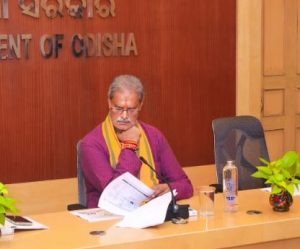Business
Odisha Government Plans to Utilize Broken Rice for Ethanol Production

The Odisha government is set to implement a plan to supply broken rice for ethanol production, a move aimed at enhancing the state’s agricultural and energy sectors. This initiative comes as more farmers are engaging in paddy cultivation due to an increase in the procurement rate, with officials announcing details on Tuesday.
The main ethanol plant, located in Bargarh District, utilizes both rice grain and rice straw to produce ethanol, contributing to the fuel blending process. This plant is part of a broader strategy involving smaller ethanol facilities across the state that also rely on grain feedstock. These smaller plants are supported by the Food Corporation of India (FCI), which allocates surplus rice to them as part of the ethanol blended petrol (EBP) program.
Inter-Ministerial Committee Meeting Discusses Roadmap
A discussion regarding the proposal was held during the inaugural meeting of the Inter-Ministerial Committee for procurement for the Kharif 2025-26 season on March 4, 2024. Chaired by Deputy Chief Minister KV Singh Deo, who oversees the Agriculture and Farmer Empowerment Department, the meeting focused on creating a roadmap for post-paddy purchase management. The government aims to complete the procurement of Kharif crops by the end of November.
According to officials, the government plans to supply broken rice for ethanol production. The meeting also addressed the distribution of free rice to economically disadvantaged families through various schemes, as well as potential exports to other countries. The procurement price has been set at Rs 3,100 per quintal, encouraging many farmers to shift their focus to paddy cultivation. This policy change has resulted in a notable 29 percent year-on-year increase in the registration of new farmers in the state.
Infrastructure Improvements and Future Plans
To ensure effective utilization of paddy after procurement, the meeting concluded with a resolution to construct additional warehouses. This initiative will be a collaborative effort involving the FCI, the Cooperation Department, and the State Warehousing Corporation. The officials emphasized that managing surplus rice after procurement is crucial for the state’s agricultural strategy.
Permanent model ‘mandis’ (markets) will also be established in coordination with various departments to streamline the process. Plans include opening more rice mills and upgrading existing facilities to hybrid models to enhance processing efficiency.
As the Odisha government moves forward with these plans, the focus remains on maximizing the benefits of paddy cultivation while supporting local farmers and contributing to sustainable energy production.
-

 World5 months ago
World5 months agoSBI Announces QIP Floor Price at ₹811.05 Per Share
-

 Lifestyle5 months ago
Lifestyle5 months agoCept Unveils ₹3.1 Crore Urban Mobility Plan for Sustainable Growth
-

 Science4 months ago
Science4 months agoNew Blood Group Discovered in South Indian Woman at Rotary Centre
-

 World5 months ago
World5 months agoTorrential Rains Cause Flash Flooding in New York and New Jersey
-

 Top Stories5 months ago
Top Stories5 months agoKonkani Cultural Organisation to Host Pearl Jubilee in Abu Dhabi
-

 Sports4 months ago
Sports4 months agoBroad Advocates for Bowling Change Ahead of Final Test Against India
-

 Science5 months ago
Science5 months agoNothing Headphone 1 Review: A Bold Contender in Audio Design
-

 Top Stories5 months ago
Top Stories5 months agoAir India Crash Investigation Highlights Boeing Fuel Switch Concerns
-

 Business5 months ago
Business5 months agoIndian Stock Market Rebounds: Sensex and Nifty Rise After Four-Day Decline
-

 Sports4 months ago
Sports4 months agoCristian Totti Retires at 19: Pressure of Fame Takes Toll
-

 Politics5 months ago
Politics5 months agoAbandoned Doberman Finds New Home After Journey to Prague
-

 Top Stories5 months ago
Top Stories5 months agoPatna Bank Manager Abhishek Varun Found Dead in Well









